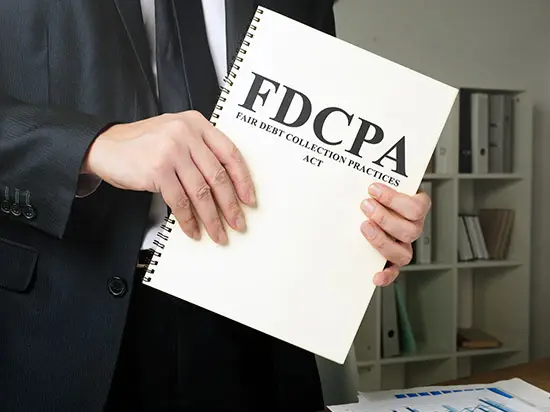What is the Fair Debt Collection Practices Act?

The Fair Debt Collection Practices Act (FDCPA) protects consumers from unfair and abusive collection practices. The law regulates professional, third-party collection businesses, agents and attorneys, but not "in-house" collectors, or employees of creditors who collect their own debts.
Some of the provisions of the Fair Debt Collection Practices Act are:
- A collector may contact debtors in person, by mail, telephone, telegram, or fax. However, a debt collector may not contact a debtor at inconvenient times or places, such as before 8 a.m. or after 9 p.m., unless the debtor allows it. A debt collector also may not contact a debtor's workplace if the collector knows that the debtor's employer doesn't allow personal calls.
- A debtor can stop a collector from contacting them by writing to the collection agency requesting that they discontinue their actions. Once the collector receives the letter, they may not contact the debtor again except to say there will be no further contact or to notify them that the some specific action may be taken. It is important to know that sending such a letter to a collector does not erase the debt if the monies are actually owed. The debt collector or the debtor's original creditor may still have the right to sue the debtor.
- A collector has limitations as to whom they are allowed to contact when trying to collect a debt. For instance, the collector must contact the debtor directly unless the collector is informed that they must contact the debtor's attorney regarding the debt. The collector may also contact other people, but only to find out where the debtor lives, what their phone number is, and where they work. Collectors usually are usually allowed to contact third parties only once, unless they believe that the person gave incorrect or incomplete information.
Debt collectors may not harass, oppress, or abuse debtors or any third parties they contact.
Some examples of harassment would be:
- Threatening violence.
- Using profanity and obscenities.
- Making continuous telephone calls.
Debt collectors may not use any false or misleading statements when collecting a debt.
Some examples of false statements would be:
- Implying that they are attorneys or government representatives, when they are not.
- Implying that the debtor has committed a crime.
- Falsely representing that they operate or work for a credit bureau.
- Misrepresenting the amount of the debt owed.
- Indicating that papers being sent are legal forms, when they are not.
- Indicating that papers being sent are not legal forms, when they are.
Collectors cannot state that:
- A debtor will be arrested if they do not pay the debt.
- They will seize, garnish, attach, or sell property or wages, unless the collection agency or creditor intends to do so, and it is legal to do so.
- Actions, such as a lawsuit, will be taken against the debtor, when such action may not legally be taken, or when they do not intend to take such action.
Debt collectors are also prohibited from:
- Giving false credit information about the debtor to anyone, including a credit bureau.
- Sending the debtor anything that looks like an official document from a court or government agency, when it is not.
- Using a false name.
Debt collectors may not engage in unfair practices when they attempt to collect a debt.
For example, debt collectors cannot:
- Collect any amount greater than the debt, unless state law permits such a charge.
- Deposit a postdated check prematurely.
- Use deception to make the debtor accept collect calls or pay for telegrams.
- Contact the debtor by postcard.
If any violation occurs, the debtor has the right to pursue legal action against the collector in a state or federal court within one year from the date the law was violated. If the debtor wins, they may recover money for the damages suffered plus an additional amount up to $1000. Court costs and attorney's fees also can be recovered. A group of people also may sue a collector and recover money for damages up to $500,000, or 1% of the collector's net worth, whichever is less.
Consumers should report any problems they have with debt collectors to their state Attorney General's office and the Federal Trade Commission. Many states have their own debt collection laws, and their Attorney General's office can help them determine their rights.
